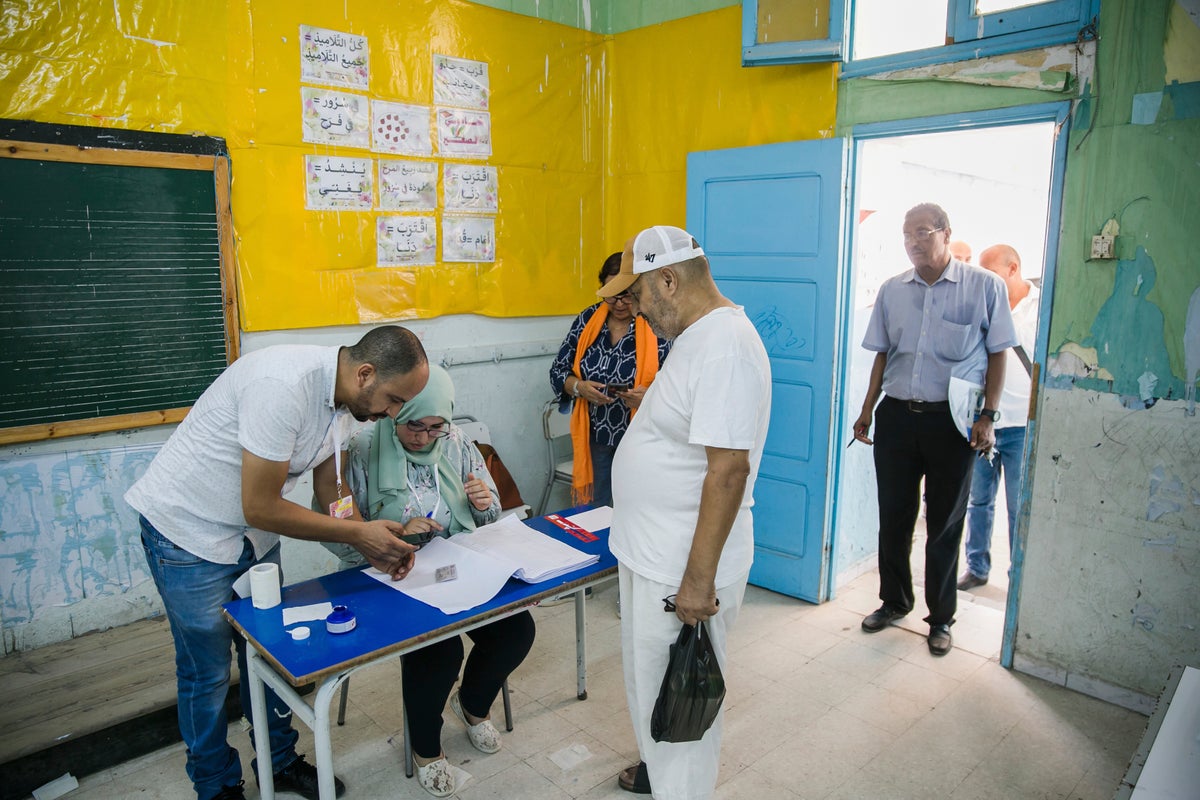
Hundreds of supporters of Tunisian President Kais Saied took to the streets to celebrate after the end of voting on a controversial new constitution that critics say could reverse hard-won democratic gains and entrench a presidential power grab
President Kais Saied joined a large crowd of supporters early Tuesday as they marched down Tunis' central thoroughfare, waving national flags, cheering and blaring car horns after an unofficial exit poll result late Monday suggested that a majority of voters approved the new constitution.
Escorted by a strong security detail, Saied told the media he would ensure “a much better future” for Tunisians and pledged improved living conditions while continuing the fight against corruption.
“We have gone from the shore of despair and disillusion to the shore of hope" he said. “There will be no turning back... This is a total break with a system forever rejected"
Many supporters ululated and jostled to get a photo of Saied on their smartphones as he walked down the avenue.
“I wish him victory against his enemies, we hope that God will protect him from the wicked. Congratulations, congratulations, look after yourself Kais Saied!” said one supporter, Haida, who only gave her first name.
According to the Independent High Authority for Elections (ISIE), an official preliminary result is expected Tuesday evening and the final result on August 28.
The proposed constitution gives the office of the president all executive powers and removes key checks and balances. The power of Tunisia’s judiciary and parliament would be greatly reduced.
Critics warn that Saied’s new political structure could pave the way to a new autocracy in the country that rose up against former autocratic strongman Zine El Abidine Ben Ali in 2011 and kicked off the Arab Spring pro-democracy protests. Tunisia is the only nation to emerge with a democracy from those protests.
Monday’s referendum took place a year to the day after Saied froze Tunisia’s parliament and dismissed his government. Critics then derided the move as “a coup” but Tunisians, who had grown exasperated with the country’s political elites and years of economic stagnation, celebrated it. In the year since then, Saied has given himself the power to rule by decree and has fired dozens of judges, decisions that have provoked a series of protests.
Saied still enjoys widespread popular support. In 2019, Saied won the Presidency with over 70% of the votes in the second round, while recent polls put his approval rating at well over 50%. Many believe the new constitution will put an end to years of political deadlock and will reduce the political influence of Tunisia's largest party, Ennahdha, the deeply unpopular Islamist party.
A desire for change was evident among voters who spoke to the Associated Press after the polls closed late Monday.
“This was an important day, I hope that all Tunisians vote to raise the level of the country and improve it” said Yahia Arafet, after casting his vote.
Olfa Hmid said she felt Tunisia had reached “the stage of collapse”.
“The future is not clear and we do not see anything clear. We are thinking about the future of our children and our country and we want to see it advanced. It is a really unfortunate situation and we hope for a better tomorrow” said Hmid.
With Saied’s critics calling for a boycott of the referendum, turnout was a sticking point for the president. Many observers expected a low voter turnout partly because the boycott but also because of Tunisians' disenchantment with politics and their struggles with rising inflation that has reached 8.1%.
ISIE President Farouk Bouaskar said late Monday that preliminary figures suggested a turnout of 27.5% of 9.3 million registered voters.
Saied had sidestepped an AP question whether a low turn out would cast doubt on the referendum’s validity. Speaking as we walked with supporters early Tuesday, Saied said that he had tried to get "as many Tunisians as possible engaged with this election”.







